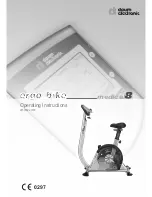
9
MAINTENANCE INSTRUCTIONS
This is general information for daily, weekly and monthly maintenance to be performed on your bike.
DAILY MAINTENANCE
After each exercise session, wipe down all
the equipment: seat, frame and handlebars.
Pay special attention to the seat post,
handlebar post and belt/chain guard. Sweat
is very corrosive and may cause problems
that require parts replacement later.
1. Get on the bike and start pedaling.
2. Pay attention to any vibrations felt
through the pedals. If you feel any
vibrations, you may need to tighten the
pedals, bottom bracket, or adjust the drive
belt/chain tension.
3. Use a
wrench
to tighten the pedals until
they are secure.
MONTHLY MAINTENANCE
1. Check that hardware is secure, such as:
water bottle holder, flywheel nuts,
belt/chainguard bolts, brake caliper lock nuts
and brake caliper tension rod nuts.
2. Inspect the brake tension rod for signs of
wear such as missing threads. Clean and
lubricate the brake tension rod.
3. Clean and lubricate the seat post, handlebar
post and seat slider. Remove any build-up of
foreign material.
WEEKLY MAINTENANCE
1. Inspect moving parts and tighten the
hardware.
2. Inspect pull pin frame fittings, making
sure the fittings are snug. Loose frame
fittings may strip out threads over time
and cause extensive damage.
3. Clean and lubricate pop-pin assemblies.
Pull on the pin and spray a small amount
of lubricant onto the shaft.
4. Tighten the seat hardware, making sure
the seat is level and centered.
5. Brush and treat the resistance pads.
Remove any foreign material that may
have collected on the pads. Spray the
pads with silicone lubricant. This helps to
reduce noise from friction between the
pads and the flywheel.
6. Visually inspect the bottom bracket, toe
clips and toe straps. If any of them are
loose or disconnected, attach and tighten.
LEATHER BRAKE PAD CARE (If applicable)
1. Perform this maintenance when the brake
pad is first installed and throughout the brake
pads life. Following these simple guidelines
can increase the life of your brake pads.
2. Some brake pad assemblies are pre-
lubricated. Squeeze the brake pad. If
lubricant is released, then the pad has been
pre-lubricated.
3. If the brake pad is dry, then coat the brake
pad with 3-n-1 oil. Brush the leather with a
clean, wire bristle brush, and apply the oil.
The oil should be allowed to soak into the
pad. Repeat 4-5 times until the pad is
saturated, but not dripping with oil. When the
pad is saturated, it will no longer absorb oil.
4. Inspect the brake pad
weekly
and lubricate if
needed. The pad should not have a glazed
appearance. If the pad appears glazed, then
brush it with wire brush and apply lubricant
as needed. If any of the sponge padding is
showing through the leather pad, the brake
pad should be replaced.
Summary of Contents for Racer 500
Page 3: ...2 EXPLODED DIAGRAM ...




























